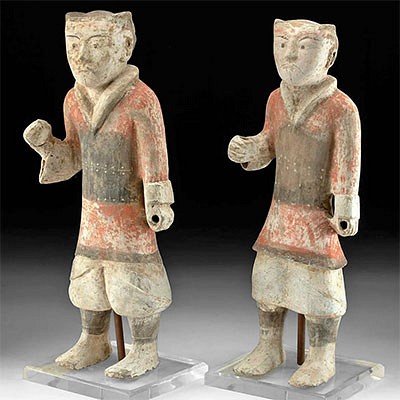African Yoruba Beaded Diviner Sashes w/ Snakes
Lot 165
About Seller
Artemis Gallery
686 S Taylor Ave, Ste 106
Louisville, CO 80027
United States
Selling antiquities, ancient and ethnographic art online since 1993, Artemis Gallery specializes in Classical Antiquities (Egyptian, Greek, Roman, Near Eastern), Asian, Pre-Columbian, African / Tribal / Oceanographic art. Our extensive inventory includes pottery, stone, metal, wood, glass and textil...Read more
Estimate:
$900 - $1,350
Absentee vs Live bid
Two ways to bid:
- Leave a max absentee bid and the platform will bid on your behalf up to your maximum bid during the live auction.
- Bid live during the auction and your bids will be submitted real-time to the auctioneer.
Bid Increments
| Price | Bid Increment |
|---|---|
| $0 | $25 |
| $300 | $50 |
| $1,000 | $100 |
| $2,000 | $250 |
| $5,000 | $500 |
| $10,000 | $1,000 |
| $20,000 | $2,500 |
| $50,000 | $5,000 |
| $100,000 | $10,000 |
| $200,000 | $20,000 |
About Auction
By Artemis Gallery
May 25, 2023
Set Reminder
2023-05-25 10:00:00
2023-05-25 10:00:00
America/New_York
Bidsquare
Bidsquare : ON-SALE! Antiquities, Pre-Columbian, Ethno, Fine Art
https://www.bidsquare.com/auctions/artemis-gallery/on-sale-antiquities-pre-columbian-ethno-fine-art-12860
ON-SALE Antiquities, Pre-Columbian, Ethno, More! Artemis Gallery info@artemisgallery.com
ON-SALE Antiquities, Pre-Columbian, Ethno, More! Artemis Gallery info@artemisgallery.com
- Lot Description
West Africa, Nigeria, Yoruba culture, ca. early to mid-20th century CE. A pair of ornate sashes made from cotton cloth and covered with thousands of glass seed beads and cowrie shells to form colorful patterns and symbols, the larger is in the shape of a snake and the other is rectangular. Belt sashes such as these were symbols of spiritual position and worn during ceremonies by Ifa diviners / priests. The snake panel contains crocodiles and scorpions, the other with anthropomorphic horned faces / masks, fish, and snakes. The time and painstaking work to make both of these panels is intensive but the resulting sashes are astoundingly beautiful and desirable today as decorative wall hangings. The cloth on the verso of both has nice signs of age. Size of snake sash: 62" L x 6.3" W (157.5 cm x 16 cm)
Even though the Yoruba have a long history of glassmaking, the beads used to make this special clothing were imported from the British during the late 19th century. During this period, glass beads signified high status and substantial wealth. Such petite European "seed beads" were thought to be particularly special, due to their uniform size and wide variety of colors. Wearing clothing covered with so many precious beads would certainly indicate rank and wealth. The zigzag and triangular patterns symbolize lightning as well as vipers, an emblem of power.
Provenance: private Niwot, Colorado, USA collection
All items legal to buy/sell under U.S. Statute covering cultural patrimony Code 2600, CHAPTER 14, and are guaranteed to be as described or your money back.
A Certificate of Authenticity will accompany all winning bids.
We ship worldwide and handle all shipping in-house for your convenience.
#176986Some fraying to threads and beading on the rectangular sash, some looser strands of beads and a few losses, but overall great condition. Snake sash has some minor fraying, but beadwork is intact and excellent. Discoloration and staining to cloth verso on both commensurate with age and use.Condition
- Shipping Info
-
All shipping is handled in-house for your convenience. Your invoice from Artemis Gallery will include shipping calculation instructions. If in doubt, please inquire BEFORE bidding for estimated shipping costs for individual items.
-
- Buyer's Premium



 EUR
EUR CAD
CAD AUD
AUD GBP
GBP MXN
MXN HKD
HKD CNY
CNY MYR
MYR SEK
SEK SGD
SGD CHF
CHF THB
THB















